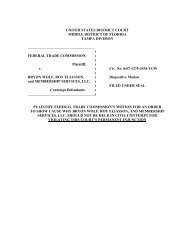Complaint Counsel's Post Trial Brief - Federal Trade Commission
Complaint Counsel's Post Trial Brief - Federal Trade Commission
Complaint Counsel's Post Trial Brief - Federal Trade Commission
Create successful ePaper yourself
Turn your PDF publications into a flip-book with our unique Google optimized e-Paper software.
Respondents' Interet advertisements (CX 12-15) to see that Respondents' advertisements do<br />
not even contain the DSHEA disclaimer that "Ths statement has not been evaluated by the FDA.<br />
Ths product is not intended to diagnose, treat, cure, or prevent disease," a disclaimer that must<br />
be "prominently displayed and in boldface tye." See 21 U.S.C. § 343(r)(6). Instead, any<br />
disclaimers Respondents do make, where they do appear, are in fie-prit. For example, at the<br />
bottom of their product pages on the DCO Web site, under the copyrght line, Respondents<br />
simply state: "The information on this website is . . . not intended to diagnose a disease." Such<br />
disclaiers are inadequate to cure Respondents' deceptive claims, which are promiently<br />
featued on the Web site.<br />
It is well-established that adversers canot use fie prit to contradict other statements<br />
in an adverisement or to clear up misimpressions the adverisement would otherise leave.<br />
Deception Policy Statement, 103 F.T.C. at 180-81. To be effective, disclosures must be clear<br />
and conspicuous. See, e.g., Thompson Med., 104 F.T.C. at 842-43 (1984). U.S. v. Lane Labs<br />
makes it clear that any such disclaimer also must be in boldface tye and is perssible only if<br />
the claim is properly substantiated. U.S. v. Lane Labs, Inc., 324 F. Supp. 2d 547.564 (D.N.J.<br />
2004) (stating that "( t )hese tyes of claims are perssible under DSHEA only if the<br />
manufacturer of the dietary supplement has "substantiation" that the "statement is<br />
truthful and not misleadig" and if the label contains the followig disclaimer in boldface<br />
tye: "Ths statement has not been evaluated by the Food and Drug Adminstration. Ths<br />
product is not intended to diagnose, treat, cure, or prevent any disease") (emphasis added).<br />
Even if a prominent, bold-tye DSHEA disclaimer had been used, that could not cure<br />
Respondents' deceptive statements. As the Dietary Supplements Guide states, "the inclusion of<br />
the DSHEA disclaimer is not likely to negate the explicit disease claims made in the "ad, and wil<br />
20

















